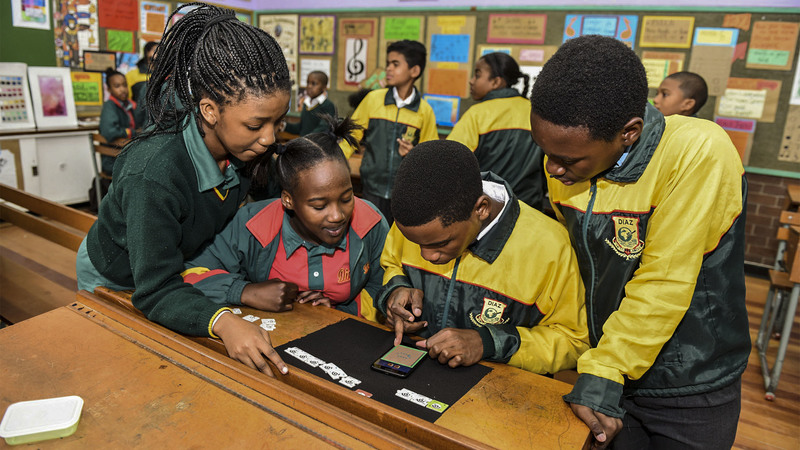
The continent must invest in its potential resource, youth, by ensuring rapid and comprehensive digital skills development.
AAfrica’s vast mineral and natural resources have fueled the continent’s economy for generations.
But the world is moving rapidly toward a more sustainable, resource-less future. As we celebrate Africa Month, the question is: Can African economies ensure that the continent can thrive and prosper well into the next century?
United Nations data It says Africa holds 30% of global mineral deposits, 12% of all oil reserves and 8% of the world’s gas reserves. 40% of global gold deposits – and 90% of platinum and chromium – are found in African soils.
Africa produced Half of the world’s diamonds in 2020, countries like Botswana and South Africa continue their leading role in the global diamond market. In the 1970s, South Africa alone produced two-thirds of the world’s gold, a tradition that continues, although the country is close to China, Australia and Ghana.
The continent is not only endowed with abundant legacy resources like diamonds and gold. Many of the minerals needed to power the next generation of technologies are abundant in Africa.
The Democratic Republic of Congo alone accounts for almost two-thirds (63%) of the world’s cobalt in 2019, and lithium production – a critical manufacturing component of smartphones, laptops and electric vehicles – is expected to grow from 40 000 tonnes. 2023 By the end of the decade nearly half a million tons.
But there is a limited amount of natural resources under the African soil. At some point in the future, African countries will have to move away from their reliance on resource extraction to strengthen their economies.
already, Some experts It is said that the world has reached the peak of gold production and the amount of gold produced in a year will decrease from here.
This is bad news for a continent that relies heavily on revenue from natural resources. A UN report found Africa’s mining sector contributed nearly 7% of the continent’s GDP in 2017, while minerals accounted for nearly two-thirds (62%) of the continent’s exports in 2019.
But what if Africa already has a natural resource that beats all others, and can decide to mine the continent’s wealth and strengthen its economy through innovation, ingenuity and productivity? What if we could mobilize the continent’s abundant young talent?
Talent is the new gold
Africa’s population will grow dramatically throughout this century. While populations in more developed regions are stagnating and falling, Africa’s youth population is booming. Between 2020 and 2050, 1.2 billion people are expected to be added to Africa’s population. UN data predicts that by 2100, the continent’s population will reach 4.3 billion. Three times its current size.
Much of this growth is concentrated among younger age groups. Africa’s working-age population will increase by two-thirds. By 2030, there will be more than 600 million.
With millions of well-educated young Africans entering the workforce every year, global companies can rely on African talent to fill critical skills gaps. The World Economic Forum estimates that 85 million jobs will remain unfilled by 2030. creating an $8.5 trillion gap between potential and actual revenues.
Note that the revenue gap is not caused by technological limitations, but rather by realizing the effect of the next wave of technological innovation – artificial intelligence, connected devices, intelligent enterprises.
It is therefore not a stretch to say that Africa’s greatest natural resource is its skilled, youthful workforce.
A survey conducted by Gallup found that digital Skills generate $18.5 trillion in annual economic value, or 12% of global GDP. In the same study, advanced digital workers had higher job satisfaction rates and felt more secure in their jobs than workers with low digital skills.
Mobilizing Africa’s youth workforce through rapid and comprehensive digital skills development holds the key to unlocking the continent’s economic potential.
African countries should invest some of their natural resource revenues in developing digital skills. Infrastructure such as 5G internet and extensive mobile coverage is essential, especially in countries without traditional fixed line infrastructure.
A government-led national digital skills strategy should be a priority for every education sector on the continent.
Public-private partnerships that enable collaboration between governments and the corporate sector help focus efforts, ensuring that any digital skills development initiatives meet real-world business needs and create skills that are easily absorbed into the formal economy.
Private sector organizations can partner with social enterprises and non-profit organizations that promote or develop digital capabilities.
Organizations must succeed in their own digital skills development efforts to ensure they have access to digital skills ready to work.
Efforts to expand access to digital learning opportunities must also continue. For example, Africa Code Week has provided basic coding training to 14.6 million African youth in 48 countries. With a female participation rate of 47%, the initiative has made great strides in enabling digital learning opportunities for all who can benefit.
The African continent stands on the cusp of a new era, defined not by its mineral wealth but by its extraordinary talent and innovation. Preparing and mobilizing the continent’s youth workforce should be a priority for every public and private sector organization in every African country. Smart investments in digital skills now will pay dividends for generations to come, and help the continent build prosperous lives for all.
Cathy Smith is Managing Director at SAP Africa.
The views expressed are those of the author and do not necessarily reflect official policy or position The Mail & Guardian.

„Oddany rozwiązywacz problemów. Przyjazny hipsterom praktykant bekonu. Miłośnik kawy. Nieuleczalny introwertyk. Student.
